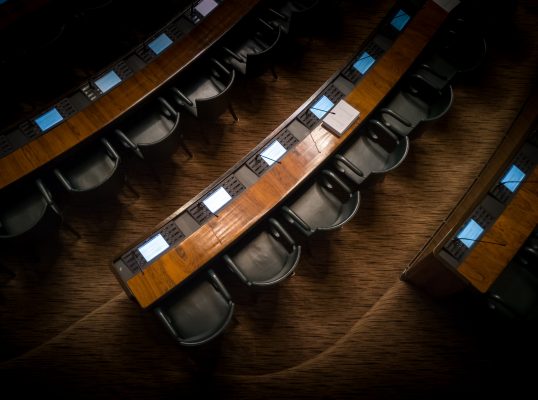In this new legal analysis, we specifically look into content regulation on the internet carried out by the Prosecutor’s office and how the measures in place, silence free speech often relying on the use of a restrictive law on Information, Informatization, and Protection of Information.
As the use of the Internet grew in Azerbaijan, so did the measures adopted by the government to regulate the internet space, through legal changes that would tighten existing regulations. As such the ranking of Azerbaijan in Freedom House Freedom on the Net report as “not free” is indicative of the deteriorating internet freedom in several directions, including control of the ICT market, infrastructural challenges, restrictive legal measures, accounts of harassment of citizens for online criticism, and more. Numerous evidence-based reports point out the extent of coordinated, and deliberate efforts deployed by the government in Azerbaijan to restrict free speech on the users of social networks, journalists, and media at large in recent years.
Currently, two laws regulate what constitutes prohibited information on the internet and the liability for violating these requirements. These are the Law on Information, Informatization, and Protection of Information, which defines the requirements and responsibilities for individuals; and the Law on Media, which defines the (almost) similar and additional requirements and responsibilities for journalists and media.
In addition, the presidential decree dated February 22, 2022, instructed the Ministry of Justice to prepare and submit a draft law on measures for violating information and media legislation on the internet to the government within a month. The law is yet to be adopted and concerns over its text and procedural implementation give ground to worry for a new restrictive law to be adopted not to mention its implications to further stifle free speech online.
Until then, an uptick in recent months, of cases in which social media users have faced punitive measures for their online activism indicates that the Prosecutor General Office has taken on a temporary role of taking measures against activists, journalists and media within the scope of laws on information and media. As such we decided to dedicate our next legal analysis report to the practices and activities of the general prosecutor’s office within the framework of national and international legislation.
***
In Azerbaijan, the Code of Administrative Offences and the Criminal Code regulate the legal sanctions against violations of the Law on Information, Informatization, and Protection of Information. However, as noted above, an uptick in administrative penalties and warnings issued to media, journalists, and social network users in recent months shows that the main government institution carrying out monitoring, and handing out penalties and warnings has been the Prosecutor General’s Office.
This frequent and at times, aggressive interference by the prosecutor’s office, which normally is in charge of investigating criminal cases and is the prosecuting authority, itself raises a number of concerns with regard to freedom of expression and the media.
The prosecutor’s office argues that the official warnings issued by the institution are a precautionary measure for violating existing. It is worth noting, that laws here are also broadly defined. Local human rights lawyers and experts, suspect, that the prosecutor’s office relies on existing bills on Information, Informatization, and Protection of Information as well as the Media, however, it could also refer to additional articles of the Criminal Code. Therefore, the legality of these acts is questionable.
***
Recent amendments to the Information Law
On December 27, 2021, the Azerbaijani parliament (Milli Məclis) adopted new amendments to the Law of the Republic of Azerbaijan On Information, Informatization, and Protection of Information (30-VIQD).
One of the amendments includes expanding the measures against the prohibited content*
*Neither the previous nor the iterated version of the law clearly defines what is prohibited content leaving extensive room for the relevant state actors to decide, and based on these overt decisions, restrict freedom of expression online.
Previously, the owner of the internet information resource and domain name, and the hosting provider were responsible for removing (deleting) the information (specific content such as articles) from the information resource (website). The iteration obligates the owner, and the hosting provider, to block access to that content (article) on its website (Article 13-2.4, and 13-2.5).
As the law on information determines a list of grounds that define which content is prohibited, it also sets obligations for domain and information resource owners and host providers to remove or block the content upon receiving the warning from the executive authorities. In cases when content removal or blocking is not implemented, relevant executive authority applies to the court. As such, it is the judicial powers making a final judgment on the (il)legality of reported content rather than the executive power. This also means that the warnings issued by the executive authorities to the information resource and domain owners and host providers must not introduce liability. Because, when a court draws its final decision, it applies the principle of proportionality ensuring that different interests are balanced against each other.
Prohibited content as defined in the Law on Information (Article 13.2) and the Law on Media (Article 14).
Law on Media:
14.1.1. open calls must not be made for a forcible change of the constitutional order of the Republic of Azerbaijan, the disintegration of its territorial integrity, forcible seizure or retention of power, mass riots;
14.1.2. there must be no disrespect for the state symbols of the Republic of Azerbaijan;
14.1.3. norms of the state language must be observed;
14.1.4. discrimination on grounds of race, religion, origin, gender, ethnicity, and other discrimination must not be promoted, and also no open calls must be made for inciting ethnic, racial, or religious hatred;
14.1.5. terrorism, religious extremism, violence, and cruelty must not be propagated, and also, information aimed at financing terrorism, organizing or conducting training for terrorist purposes must not be disseminated, and open calls for terrorism must not be made;
14.1.6. words and expressions, gestures with immoral lexical (swearing) content must not be used;
14.1.7. the humiliation of honor and dignity, tarnishing of business reputation is not allowed;
14.1.8. secret information about a person’s family and private life must not be disseminated;
14.1.9. there must be no libel, insults, or hate speech;
14.1.10. actions that are contrary to the protection of health and the environment must not be propagated;
14.1.11. facts and developments must be commented on impartially and objectively, one-sidedness is not allowed;
14.1.12. parapsychology (psychics, mediums, etc.), superstition, or other kinds of fanaticism must not be propagated;
14.1.13. pornographic materials must not be published (broadcast);
14.1.14. information about a person being guilty must not be published (broadcast) without a valid court decision;
14.1.15. the requirements provided for in the Law of the Republic of Azerbaijan “On protection of children from harmful information” must be complied with;
14.1.16. other information provided in Article 13-2.3 of the Law of the Republic of Azerbaijan “On information, informatization, and protection of information” must not be broadcast.
Law on information, informatization, and protection of information:
*false information threatening to harm human life and health, causing significant property damage, mass violation of public safety, disruption of life support facilities, financial, transport, communications, industrial, energy, and social infrastructure facilities, or leading to other socially dangerous consequences.
- propaganda and financing of terrorism, as well as methods and means of terrorism, information about training for the purpose of terrorism, as well as open calls for terrorism;
- information on the propaganda of violence and religious extremism, open calls directed to the evocation of national, racial, or religious enmity, violent change of the constitutional order, territorial disintegration, violent seizure or maintenance of power, and organization of mass riots;
- state secrets;
- instructions or methods for producing firearms, their component parts, ammunition, and explosive substances;
- information on preparation and usage of narcotic drugs, psychotropic substances, and their precursors, about locations of their unlawful acquisition, as well as information on the location of and methods of cultivation of plants containing narcotic substances;
- pornography, including information related to child pornography;
- information on the organization of and incitement to gambling and other unlawful betting games;
- information disseminated with the purpose to promote suicide as a method of solving problems justifies suicide, provides the basis for or incites suicide, describes the methods of committing suicide, and organizes the commission of suicide by several individuals or organized groups;
- defamatory and insulting information, as well as information breaching the inviolability of private life;
- information breaching intellectual property rights;
- other information prohibited by the laws of the Republic of Azerbaijan.
The legal framework of the power of the prosecutor’s office to issue the official warnings
According to Article 133 of the Constitution, the Prosecutor’s Office of Azerbaijan (hereinafter – the “Prosecutor’s Office”) shall exercise control over the execution and application of laws, institute criminal cases, and conduct investigations. According to Article 2 of the Law About the Prosecutor’s Office, the Prosecutor’s Office of Azerbaijan is a single centralized body that, is logged in judicial authority.
According to Article 21 of the Law About the Prosecutor’s Office, issuing an official warning is one of the prosecutor’s mandates vested in its powers in the manner and within the framework established by law About the Prosecutor’s Office. Article 22 of the Law identifies under which circumstances, the prosecutor or his deputy shall issue an official warning to the citizen or official.
Because these warnings, as procedural acts, are not established in the administrative code of offenses or in the criminal procedural codes of the Azerbaijan Republic, they serve as a deterrent for individuals from certain actions, such as stopping, not repeating, or not taking any other action in the future.
Powers of the Prosecutor’s Office in the cases of administrative offenses
Article 54 of the Code of Administrative Offenses determines the scope of the prosecutor’s supervision power in the cases of administrative offenses. Within its power, the prosecutor shall take timely measures to eliminate the violation of the law during the proceedings on administrative offenses and exercise the prosecutor’s control over the application and implementation of the Constitution and laws of Azerbaijan.
The first sentence of Article 54.2 of the Code outlines a list of administrative offenses where the prosecutor’s office is empowered to initiate the administrative offense cases. The second sentence of the same Article also gives unlimited power to the Prosecutor’s office to initiate administrative offense cases for any other cases envisaged in the Code of Administrative Penalties.
Once the decision to initiate proceedings on administrative offenses is made, the Prosecutor’s Office then shall send the case to a judge or an authorized body for judiciary proceedings on the merits of the case. Overall, the scope of the prosecutor’s supervision concerning administrative offenses includes the right of the prosecutor to decide on the initiation of proceedings on administrative offenses, to participate in consideration of cases on administrative offenses, to give an opinion or petition on issues arising during the proceedings, to protest against a decision or to rule on an administrative offense.
Thus, the prosecutor’s office has the authority to take measures of responsibility and deterrence against the dissemination of prohibited information on the Internet under the existing legislation on administrative offenses and the law of the prosecutor’s office.
Prosecutor General’s Office warnings to journalists and social media users – comments on recent cases
Detecting dissemination of prohibited information on the Internet and taking non-criminal measures against it is carried out (in the order of checking the information on the violation of the law) by the department for Non-Criminal Prosecution of the Prosecutor General’s Office of Azerbaijan.
In recent months, there have been numerous reports in the media about some social media users, journalists, and news websites receiving warnings or handing administrative offenses in case materials, submitted to the courts by the Prosecutor General’s Office.
Example 1:
On April 1, 2022, the Prosecutor General’s Office warned two online media platforms for spreading inaccurate information. According to the Press Service of the Prosecutor General’s Office, “gazet.az” and “manset.az” published inaccurate information on March 31, 2022, about an incident in which as a result of collapsed school building some 20 people died, and many more were injured in Nakhchivan, thus violating the requirements of the Laws of the Republic of Azerbaijan “On Information, Informatization and Protection of Information”, as well as “On Media”.
But neither of the laws prohibit the spread of inaccurate information, nor do these laws define what inaccurate information is. The vagueness of the terminology however does allow the law enforcement authority to define any kind of views, and comments as “inaccurate information” and take punitive or deterrent legal action against them.
Example 2:
According to the press service of the Prosecutor General’s Office dated January 24, 2022, the Prosecutor General’s Office of the Republic of Azerbaijan continued to take preventive measures against the placement of prohibited information by law on the Internet, for the purpose of ensuring information security.
The press service then referred to five social media users who received warnings and one person who was detained on the grounds of putting pressure on democratic institutions, disrupting the activities of government agencies, making calls that would result in the governance decline in the country, as well as posting insulting or defamatory information on Facebook thus violating Article 13-2.3.9 of the law on the information.
However, Article 13-2.3.9 of the Law on Information, Informatization, and Protection of Information cited by the Prosecutor General’s Office only prohibits the dissemination of “information that is insulting or slander, as well as infringing on the privacy of private life.” The law does not prohibit the information that could be characterized as putting “pressure on democratic institutions”, “disrupting government agencies”, or “calling to reduce the level of governance in the country” on the list of prohibited information.
Example 3:
On December 21, 2021, Prosecutor’s office issued a warning to the principal of a high school, who was interviewed about the suicides among students. The Prosecutor’s office said the information shared by the school principal qualified as prohibited content, and thus was unacceptable to spread.
The Prosecutor General’s Office did not reveal further details about the case and specifically what parts of the principal’s interview violated the rules about the information on suicide. Article 13-2.3.8 of the Law on Information only prohibits the information that “promotes suicide as a method of solving problems, justifies or incites suicide, explains the methods of committing suicide or information to organize the suicide of several people in a group.”
Example 4:
On December 28, 2021, Prosecutor’s office issued a warning to 5 social media users for violating Article 13-2 of the Information law by spreading the information without citing certain facts and sharing biased information aimed to stir sensation in the society. The prosecutor’s office further urged social media users and journalists “to refrain from disclosing inaccurate and distorted information,” warning “that the most serious measures would continue against the spread of biased and misleading information in society.”
Similar, non-criminal legal action (i.e., warning) by the Prosecutor’s Office was made on November 21, 2021, against some media and social network users. The Prosecutor General’s Office initiated a violation of an administrative offense under Article 388-1.1.1 of the Code of Administrative Offenses and sent the case to the relevant court for consideration. In addition, three other people were warned by the prosecutor. The Prosecutor General’s Office further urged more serious measures in accordance with the relevant legislation, including criminal liability against media and social network users who disseminate false and inaccurate information in order to create artificial agitation.
However, Article 13-2 of the information law does not prohibit information of a “sensational” nature or for not basing information “on concrete facts” or sharing “various biased information.”
Legal commentary on warning acts issued by the Prosecutor General’s Office
As noted above, although formal warnings are defined as a type of prosecutorial act, they do not explicitly determine the concrete legal consequences for the persons receiving these warnings. As such, it is possible to determine from existing cases that these warnings issued by the prosecutor’s office are announced after alleged perpetrators are called in for questioning.
It is also possible to determine that inviting the alleged perpetrator to the prosecutor’s office is done for the purpose of signing the warning act, as a way to consent and/or admit to violating the law and not repeating it again. This was reflected in the case of journalist Avaz Zeynalli* who after being called in for questioning refused to sign the issued warning. In such cases (when the warned entity does not sign the warning) it does not remove or cancel the warning. Also worth noting is that there are no specific points mentioned in the existing legislation about measures leveled against entities who refuse to sign the warnings.
Finally, while these official warnings are carried out as preventive measures against violating existing legislation the procedural action itself is prescribed neither in the criminal law nor in the Code of Administrative Offenses. And according to the Supreme Court of the Republic of Azerbaijan, “warnings” must be examined within the framework of administrative proceedings by the administrative courts. As such, the court clearly states, that warnings are issued within the framework of administrative proceedings, the prosecutor’s office functions as a law enforcement authority and has the authority to summon the individual to introduce the warnings. Such instances of summoning and conversations are apparently mandatory and carried out by the Prosecutors like “procedural coercive measures” indicated in the Criminal Procedure Code. Nevertheless, once again, it is important to note that the warning(s) is not a sanction within the meaning of criminal law and administrative offenses law and therefore prosecutor’s office shall not apply procedural coercive measures in the absence of any offense.
*The decision of Supreme Court of the Republic of Azerbaijan, № 2-1(102)-134/2019, 14.05.2019, Avaz Zeynallı v.Chief Prosecutor’s office.
Conclusion
What the cases above illustrate is that there is a problematic and overbroad application of legal measures against social media users, journalists, and media in Azerbaijan. The examples further indicate the application of restrictive information law (which includes vaguely defined grounds to restrict free speech) against free speech on the internet and its likelihood of violating freedom of speech and media freedom standards.
Social media users, journalists, and media may argue that government regulations and their overbroad application by the Prosecutor General’s Office impermissibly infringe their freedom of speech guaranteed under the Constitution and international conventions to which Azerbaijan is a party.
Furthermore, there are almost no reports of domestic courts rejecting petitions by the prosecutor’s office against people’s rights to exercise their right to freedom of speech online, creating additional concerns about the absence of effective judicial and other remedies against the arbitrary use of domestic legislation against speech freedom rights.
As mentioned in the analysis above, one of the main challenges is that in its current form, the law on Information as well as the Code of Administrative Offenses provides vaguely defined grounds which are then used by the Prosecutor General’s Office with wide and arbitrary discretion, and at times, in the absence of any clear citing of the permissible grounds in the law. Such interference with freedom of speech is not compatible with the international standards which require that the restrictions on freedom of speech are clearly defined and concisely envisaged in the law and pursue legitimate aims as prescribed in national laws.
An analysis of most of the above cases shows that the Prosecutor General’s Office and the domestic courts interfere in freedom of expression without the proper legal grounds required for such interferences. The content of the impugned remarks characterized by the Prosecutor General’s Office and domestic courts as false, inaccurate, aimed to create a sensation, or to put pressure on the government and democratic institutions is not explicitly mentioned in the Law on Information, Informatization, and Information protection. This is against international standards which require that the national authorities intervening in the freedom of expression must have a basis in national laws (as a rule, this would mean a written and public law adopted by parliament), as well as must demonstrate sufficient reasons for justifying the interference and carefully balancing the applicants’ right to freedom of expression with the other permissible (legitimate) grounds
Azerbaijan is obligated to protect the right to freedom of expression, including the right to seek, receive, and impart information both online and offline, including on public health. International human rights treaties, including the International Covenant on Civil and Political Rights (Article 19) and European Convention on Human Rights (Article 10) permit restrictions on freedom of speech only if they are provided for by law, are strictly necessary and proportionate to achieving a legitimate aim.
Considering the increased scope of the legal harassment, it would be fair to conclude that such a large-scale punitive and deterrent legal measures against freedom of expression by law enforcement authorities is aimed at silencing legitimate criticism, discouraging citizens from expressing their views, and further suffocating the freedom of expression on the Internet.




